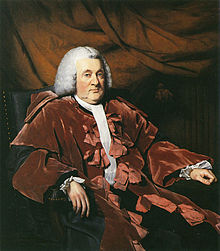
Back روبيرت دونداس (قاضى) ARZ Robert Dundas le Jeune French Robert Dundas il Giovane Italian Дандас, Роберт (судья) Russian
Lord Arniston | |
|---|---|
 Portrait of Dundas by Henry Raeburn | |
| Lord President of the Court of Session Lord Justice General | |
| In office 30 April 1760 – 13 December 1787 | |
| Appointed by | George III |
| Preceded by | Robert Craigie |
| Succeeded by | Thomas Miller |
| Member of Parliament for Midlothian | |
| In office 1754–1761 | |
| Preceded by | Robert Balfour-Ramsay |
| Succeeded by | Sir Alexander Gilmour |
| Lord Advocate | |
| In office 1754–1760 | |
| Preceded by | William Grant |
| Succeeded by | Thomas Miller |
| Solicitor General for Scotland | |
| In office 1742–1746 | |
| Preceded by | William Grant |
| Succeeded by | Patrick Haldane |
| Personal details | |
| Born | 18 July 1713 |
| Died | 13 December 1787 (aged 74) Adam's Square, Edinburgh |
| Resting place | Borthwick |
| Political party | Whig |
| Spouses | Henrietta Baillie
(m. 1741; died 1755)Jean Grant (m. 1756) |
| Children | 8, including Robert, Francis, William, Philip |
| Parent(s) | Robert Dundas of Arniston Elizabeth Watson |
| Alma mater | University of Edinburgh Utrecht University |
| Profession | Advocate, Judge, Politician |

Robert Dundas of Arniston, the younger, FRSE (18 July 1713 – 13 December 1787) was a Scottish judge. He served as Solicitor General for Scotland from 1742 to 1746, as Lord Advocate from 1754 to 1760, and as Member of Parliament for Midlothian from 1754 to 1761. He was Lord President of the Court of Session from 1760 to 1787, losing his popularity for giving his casting vote against Archibald Douglas in the famous Douglas Cause.